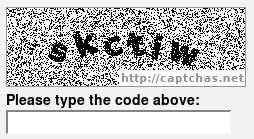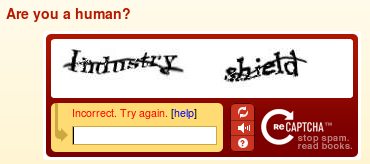Fighting Comment Spam on the Cheap with CAPTCHA
If you run a blog or website that allows public input, you've almost certainly been subjected to a spam attack. This is a problem because even one successful attack can eat up hours of time. After a recent spam attack on this blog, comments were disabled altogether. They've now been restored with the help of a more robust kind of protection, which is the subject of this article.
One of the best forms of spam protection is the Completely Automated Public Turing Test to Tell Computers and Humans Apart (CAPTCHA). CAPTCHA comes in many guises but usually consists of a noisy image of some text that a user must enter, like this one from Digg:

There are many CAPTCHA systems. The disadvantage most of them share is that they must be deployed on a server. Depending on your hosting situation and your platform, this may or may not be feasible. D-F is run by the Ruby on Rails blogging software Typo. Most CAPTCHA systems for Ruby require the installation of the C extension RMagick and its dependencies, which is either difficult or impossible on many hosts.
I recently found two solutions to this problem, and have implemented one of them:
- captchas.net This free service generates CAPTCHAs on a remote server, which your own server uses. By writing a small Ruby library and some glue code, I was able to integrate this solution, which is currently running on D-F. Here's an example in action:

- reCAPTCHA Not only does this service generate CAPTCHAs for you, but your users actually help solve OCR problems in the process. Talk about a win-win situation. If this sounds impossible, check out the description here. As an added bonus, reCAPTHCA APIs are available in a number of languages, including Ruby. reCAPTCHA is currently used on popular sites such as Twitter and looks like this:

The struggle against spam is an arms race. Currently, the best weapon for legitimate content producers is CAPTCHA, but even it can be foiled by a determined spammer. If past history is any guide, even more sophisticated forms of spam attacks and countermeasures are just around the corner.